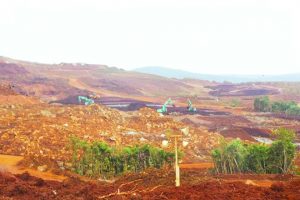Despite claims of Church, residents

TACLOBAN CITY – The Mines and Geoscience Bureau (MGB) in the region declared that they had not observed any violations on mining companies operating in Homonhon Island in Guiuan town, Eastern Samar.
This is despite complaints and allegations from residents and the local Church on the negative effects of mining operations on the historic island.
“Binabasa kasi namin yung provisions of the law. What are the grounds for cancellation? None payment of taxes, in terms of environmental, yung talagang grave abuse,” MGB-8 Regional Director Glenn Marcelo Noble said.
“This is my statement, there are no grave violations. Meron mang konti, kunyari nasira yung kaniyang siltation pond eh pwede namang ayusin yan. Nagkaroon ba ng major spills, wala,” Noble added.
He said that there is a multipartite monitoring team (MMT) that conducts visits to mining companies to monitor their operations and check if they committed violations that may be used as grounds for suspension or cancellation of their permit.
This monitoring team is composed of personnel from the MGB, Environmental Management Bureau, Department of Environment and Natural Resources (DENR), local government unit, non-government organizations, and sometimes Church leaders.
“Yung MMT is a very crucial body, multipartite yan, hindi lang MGB yan, hindi yan DENR lang , hindi yan EMB lang, hindi yang LGU lang. So pag usapan nila, at kung ano ang napag-usapan nila that is what they will recommend sa higher body,” Noble explained.
Although they can make recommendations, Noble stressed that the decision on actions against the recommendation will always depend on the DENR Secretary who signs the approval of all mining applications in the country.
At present, three mining companies are currently operating on Homonhon Island, extracting nickel and chromite that are transported to China, the biggest market for mining operations in the country.
The three mining firms are Nickelace Inc., Chromiteking and Emir. Of the three, Emir has yet to be granted the permit for its application for a 25-year mineral production sharing agreement (MPSA), while the two were granted their permits in 2009.
Based on MGB-8 recorded for 2023, Nickleace and Chromiteking were able to ship 8.22 million metric tons of nickel ore and 25,000 metric tons of chromite to China last year.
The tax paid by these mining companies last year in terms of excise tax generated an income for the government amounting to P182.62 million.
Groups such as the Save Homonhon Movement and the Diocese of Borongan are vocal in opposing the mining operations on Homonhon Island which they say destroy the environment and marine ecosystem of the place which is historically known as the first landing site of Ferdinand Magellan’s fleet in March 1521 on the first circumnavigation of the world.
Two ‘Jericho Walks’, a prayer rally in protest against mining operations were initiated last year by the Catholic Church, one was in Borongan in August, and in November in Guiuan town in November but was postponed after the local government unit of the municipality did not grant them a permit.
This year, another prayer rally is scheduled on January 20 in Guiuan town.
ROEL T. AMAZONA



